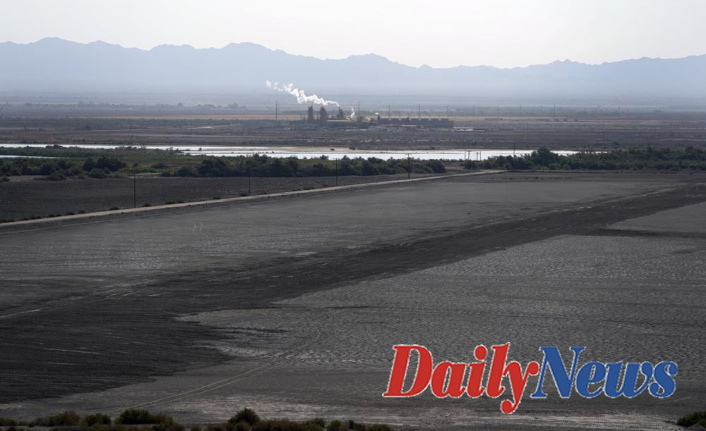To achieve its clean energy goals, the United States will require more lithium. The industry that extracts, mines, and processes this chemical element is expected to grow. It faces many challenges from environmentalists as well as Indigenous groups and regulators.
While lithium reserves can be found all over the world, there is only one active lithium mine in the United States. It is located in Nevada. This element is essential for the development of rechargeable lithiumion batteries, which are key to reducing climate-changing emissions caused by cars and other modes of transport.
The global demand for lithium was approximately 350,000 tonnes (317,517 metric tonnes) in 2020. Industry estimates suggest that demand will rise up to six-fold by 2030. In states like Maine, North Carolina and California, there are many potential lithium mining or extracting projects in various stages.
Tim Crowley, vice-president of government affairs at Lithium Nevada and a subsidiary company building a mine at Thacker Pass in Nevada, stated that "Nobody could have foreseen this enormous spike in demand." "We had the lithium space for quite some time and gave it away to China."
Most of the world's lithium is produced in South America and Australia. However, China dominates the global supply chain for lithium-ion battery batteries. The U.S. has less than 2% of the global lithium supply, but it still holds 4% of its reserves. Chile has the largest lithium reserves.
Open pit mining, or brine extraction would be used to expand domestic lithium production. This involves pumping a mineral rich brine to the surface and then processing it. The Sierra Club and other opponents raised concerns about the potential harm to sacred Indigenous lands, as well as the possibility of threatening fragile ecosystems and wildlife.
Glenn Miller, an emeritus professor of environment sciences at the University of Nevada, stated that the projects could benefit the environment over the long-term by getting rid of fossil fuel-burning vehicles.
"A domestic source is of immense value. Miller stated that it is possible to do things with production that China cannot match.
Johan August Arfwedson, a Swedish chemist, discovered lithium -- the lightest metal on Earth -- more than 200 years ago. Lithium and its compounds have been used in everything, from psychiatric medicine up to lubricating oil.
Lithium's use in rechargeable lithium batteries has seen a surge in interest over the past few years. These batteries are used in electric and hybrid cars, lawnmowers and power tools, as well as in other applications such as for charging batteries. Lithium batteries can also be used to power cell phones and laptops.
Half a million charging stations have been designated by the Biden administration as a key part of its infrastructure goals. This effort and the rapid growth of electric vehicle companies like Tesla will require more lithium to make batteries.
The proposed Thacker Pass lithium mining project is the closest to development. The proposed Thacker Pass mine in northern Nevada would produce millions of tons of lithium. However, Native American tribes claim that the mine is on sacred lands and should not be allowed to proceed.
Jonathan Evans, CEO of Lithium Americas, suggested that construction could begin late in the year. He noted that this would be the first federally permitted lithium project in six decades.
Evans stated that the growing demand for lithium will lead to more U.S. efforts to extract it. He said, "It's been a small business and it's grown rapidly." "I expect larger companies to enter this space through acquisitions or other methods."
Ioneer, an Australian company, also plans to build a large lithium mining in Nevada. The company claims it will produce 22,000 tonnes (19,958 metric tonnes) of lithium, enough to power hundreds and thousands of electric cars annually.
Environmentalists face a challenge when it comes to lithium mining projects. They promise decarbonization, but have heavy impacts on local communities and ecosystems. The Sierra Club argues that lithium mining could threaten water quality and ranching in certain states.
Lisa Belenky (senior attorney at the Center for Biological Diversity) said that the biggest challenge is to ensure lithium mines are located where they cause the least damage.
Belenky stated that "it really is very specific to the site as far as what effects it would have on the local species, and water." "Almost all energy projects we consider for climate change have their own greenhouse gas footprint."
There is potential to extract lithium in other states thanks to the drive for domestic lithium. Piedmont Lithium, an Australian company, wants to build an open-pit mine in the Kings Mountain region west of Charlotte. According to the company, this area was a major source of lithium in the region from the 1960s through the 1980s.
The largest lake in California, the Salton Sea, which is shrinking and salty, will also be used to host lithium operations. Geothermal brine can be used to extract lithium, and the Salton Sea is home to geothermal plants that have been pumping brine for decades. The proposal to extract lithium from the lake would not require as much land or water as other brining operations, according to proponents.
A spokesperson for EnergySource Minerals said that one project is expected to become operational next year. General Motors Corp. also invests in another project at the Salton Sea, which could begin producing lithium as early as 2024.
Gov. Gavin Newsom, a Democrat sees California's lithium as a way for the state to be a leader in battery production. During a January address, he called California the "Saudi Arabia" of lithium.
Dee Dee Myers is a senior advisor to Newsom who focuses on business. She said that lithium was an "increasingly crucial resource" as California and other countries pursue clean energy development to reduce climate change.
Myers stated that the state has the potential to produce "epic amounts of lithium" due to the Salton Sea resources. She said that the state wants to ensure that lithium is extracted and manufactured sustainably.
The state government could have a role in the regulation of the extraction process. California created the Lithium Valley Commission in 2020 to examine and analyze incentives for lithium extractive activities. The report must be filed by October with all findings.
Plumbago Mountain, located in Maine's western part, has been a magnet for mining interest. According to a 2020 paper published in the scientific journal Mineralium Deposita, the mountain is "a potential new lithium resource", with a higher lithium content than other similar deposits around the globe.
Maine's mining regulations may make it more difficult to extract lithium. Mike Clark, Maine's state mining coordinator, said that the Maine Department of Environmental Protection is currently reviewing the possibility of plumbago being used for lithium extraction.
Plumbago Mountain could prove to be a significant site for the U.S. in its pursuit of clean energy, according to Alicia Cruz-Uribe (associate professor of petrology & mineralogy at University of Maine).
Cruz-Uribe stated that the country's lithium reserves are among the most important in the world. "But the amount we produce is peanuts."












